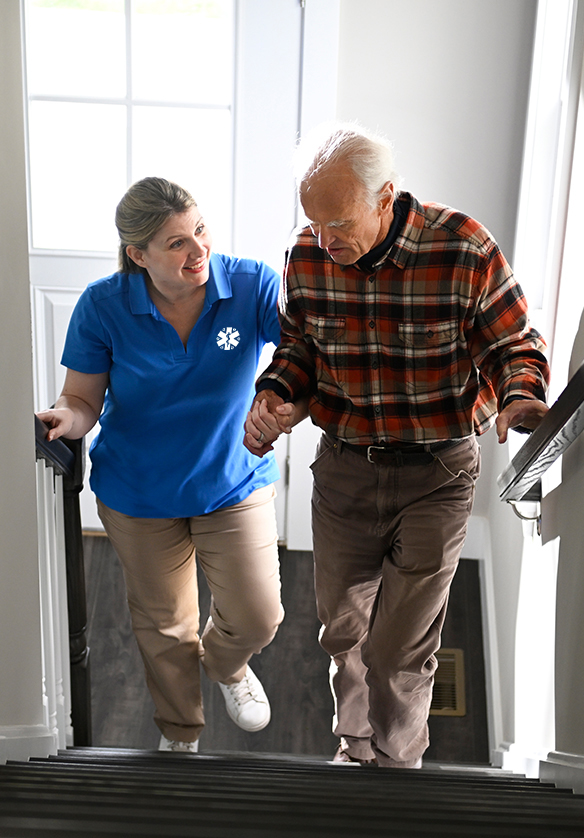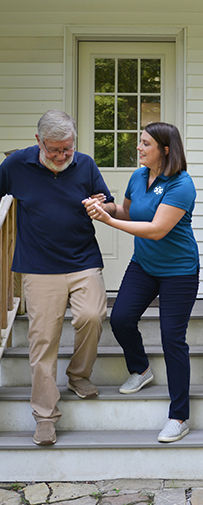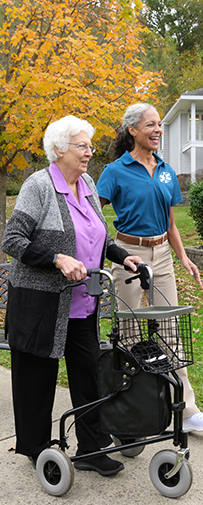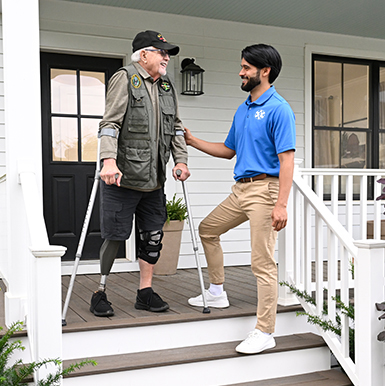Fall Prevention
Falls are the top cause of serious injuries for seniors, causing life-altering issues or hospitalizations that rob them of independence.

Alzheimer’s Care
Companion Care
Dementia Care
End-of-Life Care
Fall Prevention
Palliative Care
Personal Care
Respite Care
Day Care
Transitional Care
Contact Us About Our Home Care
Call +389 77830164 or fill out the form below.
By submitting this form, I agree to be contacted by Assistive Center via call, email and text. To opt out, you can reply 'stop' at any time or click the unsubscribe link in the emails. Message and data rates may apply. Learn more on our Privacy Policy page.
Assistive Center can play a pivotal role in reducing the risk of falls for your aging loved one at home. We will equip you and your family with essential knowledge and action steps to lower the risk of hospitalizations and serious injury for your loved one at home.

Safe and Steady Fall Prevention Program
Through our Safe and Steady Fall Prevention program—specifically designed to mitigate slips, trips, and falls among the elderly—our caregivers receive specialized training to develop fall avoidance strategies tailored to each senior’s individual needs and home environment. By fostering safe mobility and ensuring a secure living space, we empower seniors to uphold their independence and enjoy a high quality of life with confidence.
Why Fall Prevention Is Important for Seniors
Fall Prevention is paramount for seniors because it can drastically impact their safety, well-being, and quality of life. Beyond the physical injuries they can cause, falls often lead to a loss of confidence and increased fear of falling again, further limiting mobility and independence.
Seniors are more vulnerable to falls due to risk factors such as:
- Cognitive disorders
- Decreased strength
- Hearing loss
- Limited mobility
- Poor coordination
- Reduced eyesight
- Stiff or painful joints
- Taking multiple medications
Seniors are also more likely to suffer significant injuries when falls occur. Hip fractures are particularly common and dangerous for them. The recovery period can take up to a year, may require transitional care at home, and can be life-threatening. Most seniors never fully recover from a hip fracture, which can cause them to lose their autonomy at home.
You can decrease your loved one's risk of falling by making changes in their home environment and being aware of their health changes. Assess your aging parent's fall risk with the CDC's Timed Up and Go test.


How to Start the Safe and Steady Program?
When you contact your local home care office, a Assistive Center care coordinator will set up a free home care consultation with you and your senior. The coordinator will develop a personalized home care plan and recommend a caregiver suited to your loved one’s needs.
Your loved one will receive compassionate, dedicated care—and you will gain peace of mind knowing they are safe.

Frequently Asked Questions
These signs may suggest reduced strength, balance issues, or potential medication side effects affecting stability. It's important to observe these signs and consider a fall-risk health assessment to implement preventive measures and ensure their safety at home.
Assistive Center caregivers can help reduce fall risk through several types of home care. With companion care, we help your loved one maintain a safe, tidy home and help with day-to-day tasks such as light housekeeping, laundry, and errands.
If your loved one’s health increases their fall risk, personal care services can help with activities such as dressing, bathing, and mobility. Fall Prevention is key in several other Assistive Center programs, including:
- Alzheimer's care
- Dementia care
- Transitional care
Most dangerous falls occur in or around the home. Assistive Center can help you identify risk factors, such as:
- Getting a new mobility device
- Lack of grab bars in the bathroom
- Loose rugs or flooring
- Obstacles in the pathway
- Recent illness or medication changes
We’ll provide a home safety guide and checklist with easy modifications to reduce your loved one's risk of falling at home. Education topics include:
- Design changes to reduce fall risk at home
- Environmental risk factors that increase fall risk
- Lifestyle changes to improve your senior’s balance
- Physical, social, and emotional health impacts of falls on older adults
- Precautions you can take at home
Seniors can benefit from exercises like walking, tai chi, and yoga that improve balance and flexibility. Strength-training exercises using resistance bands or light weights can also help enhance muscle strength and stability.
Our professional caregivers can help implement these exercises safely and ensure they are appropriate for your loved one's fitness level.
